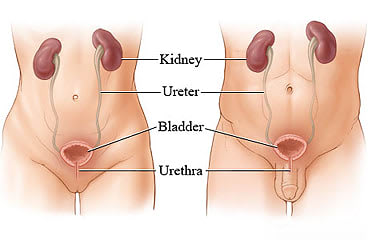What is a voiding cystourethrogram?

A voiding cystourethrogram (VCUG) is a test that is done to see if there are problems with the urinary system. The test uses contrast fluid and X-rays so the doctor can see how the bladder fills and drains. It is done by a doctor called a radiologist. A person who is trained to take X-rays, called an X-ray technician, may help the doctor during the test.
Your radiologist and technician will guide you through each step. For this test, a thin, flexible plastic tube called a catheter will be placed through your urethra into your bladder. Your bladder will be filled with a contrast liquid given through the catheter. X-rays will be taken while your bladder fills and then empties. The catheter will slip out or be removed after your bladder is empty.
You will be awake for the test. You may find it uncomfortable when the catheter is put in. Your bladder may feel very full. And you may have an urge to urinate when the contrast liquid fills your bladder. If you start to feel anxious at any time during this test, try taking deep, slow breaths.
You will be able to go home right after the test. You can go back to your usual activities right away. You may need to urinate more often for a few days after the test. You may also notice some burning during and after you urinate. This usually goes away after 1 or 2 days. Drink lots of fluids to help relieve the burning. This also helps prevent a urinary infection.
How do you prepare for the test?
Having a test can be stressful. This information will help you understand what you can expect. And it will help you safely prepare for your test.
Preparing for the test
- Tell your doctor if you are allergic to iodine. Iodine is usually used in the contrast material that the doctor will put in your bladder.
- Tell your doctor if you are or might be pregnant. Your doctor may not do the test if you are pregnant. That's because the X-rays could harm an unborn baby.
- Understand exactly what procedure is planned, along with the risks, benefits, and other options.
- Tell your doctor ALL the medicines, vitamins, supplements, and herbal remedies you take. Some may increase the risk of problems during your procedure. Your doctor will tell you if you should stop taking any of them before the procedure and how soon to do it.
- If you take a medicine that prevents blood clots, your doctor may tell you to stop taking it before your procedure. Or your doctor may tell you to keep taking it. (These medicines include aspirin and other blood thinners.) Make sure that you understand exactly what your doctor wants you to do.
What happens on the day of the test?
- Take off all jewelry and piercings. And take out contact lenses, if you wear them.
At the hospital or surgery center
- Bring a picture ID.
- The test will take about 30 to 60 minutes.
When should you call your doctor?
- You have questions or concerns.
- You don't understand how to prepare for your procedure.
- You become ill before the procedure (such as fever, flu, or a cold).
- You need to reschedule or have changed your mind about having the procedure.
Where can you learn more?
Go to http://www.healthwise.net/patientEd
Enter V282 in the search box to learn more about "Voiding Cystourethrogram (VCUG): Before Your Procedure".
Current as of: April 9, 2025
Author: Ignite Healthwise, LLC Staff
Clinical Review Board
All Ignite Healthwise, LLC education is reviewed by a team that includes physicians, nurses, advanced practitioners, registered dieticians, and other healthcare professionals.

